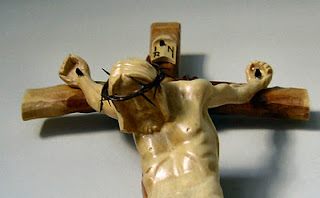 [[Dear Sister Laurel, I asked my pastor to receive my private vows as a consecrated hermit and he said he could not. I told him I read online that according to paragraphs in the Catechism that I could become a consecrated Catholic Hermit and I only need for my pastor or spiritual father to receive my vows. He said he thought I must be mistaken. I showed him the section of the Catechism that I had read with its heading "The Consecrated Life" and the paragraphs on hermits. He could see where it referred to public vows and something other than public vows but he disagreed that the opposite of these are private vows. Because he's an Order priest he told me about the nature of consecrated life and quoted par 944 and pointed out par 914 as well, but he wasn't sure if hermits were something different in the Catechism because they are something new. I asked him to look at the website I had read all this in: Catholic Hermit: How to Become a Catholic Hermit. So what do I do if my pastor won't agree with this or accept my vows? I don't have a spiritual director who might do that. I wondered if you would write him to explain how it works? The website I linked you to above doesn't have a way to contact her.]]
[[Dear Sister Laurel, I asked my pastor to receive my private vows as a consecrated hermit and he said he could not. I told him I read online that according to paragraphs in the Catechism that I could become a consecrated Catholic Hermit and I only need for my pastor or spiritual father to receive my vows. He said he thought I must be mistaken. I showed him the section of the Catechism that I had read with its heading "The Consecrated Life" and the paragraphs on hermits. He could see where it referred to public vows and something other than public vows but he disagreed that the opposite of these are private vows. Because he's an Order priest he told me about the nature of consecrated life and quoted par 944 and pointed out par 914 as well, but he wasn't sure if hermits were something different in the Catechism because they are something new. I asked him to look at the website I had read all this in: Catholic Hermit: How to Become a Catholic Hermit. So what do I do if my pastor won't agree with this or accept my vows? I don't have a spiritual director who might do that. I wondered if you would write him to explain how it works? The website I linked you to above doesn't have a way to contact her.]]
 Thanks for your email and questions. Thank you also for a link to Joyful Hermit's blog. I checked it out but found I was familiar with the post already. I suspect you haven't read my blog much before this because I have corrected misconceptions like those provided in that blog a number of times. Your pastor is correct: 1) he cannot receive private vows which would make you a consecrated hermit not only because he does not have the authority to receive such vows (or any leading to the consecrated state), but also because private vows don't admit or initiate one into the consecrated state. 2) Profession as a Consecrated Catholic Hermit requires public profession (as par 944 of the Catechism of the Catholic Church indicates). While c 603 says one may use sacred bonds other than vows (so, "not always making public vows") one always enters the consecrated state as a hermit through public profession. Period. Were I to write your pastor I would tell him this and characterize the blog you showed him as significantly misleading in this area and in the author's contention that she is a consecrated religious or a consecrated Catholic Hermit.
Thanks for your email and questions. Thank you also for a link to Joyful Hermit's blog. I checked it out but found I was familiar with the post already. I suspect you haven't read my blog much before this because I have corrected misconceptions like those provided in that blog a number of times. Your pastor is correct: 1) he cannot receive private vows which would make you a consecrated hermit not only because he does not have the authority to receive such vows (or any leading to the consecrated state), but also because private vows don't admit or initiate one into the consecrated state. 2) Profession as a Consecrated Catholic Hermit requires public profession (as par 944 of the Catechism of the Catholic Church indicates). While c 603 says one may use sacred bonds other than vows (so, "not always making public vows") one always enters the consecrated state as a hermit through public profession. Period. Were I to write your pastor I would tell him this and characterize the blog you showed him as significantly misleading in this area and in the author's contention that she is a consecrated religious or a consecrated Catholic Hermit.
Moreover, becoming a consecrated (or Catholic) Hermit is a long process with significant periods of mutual discernment (the candidate and the diocese); it requires a long period of living under the direction of a good spiritual director who understands contemplative prayer and life and who will accompany the candidate through the required process of discernment. One cannot simply decide one wants to make private vows and expect the Church to recognize one has an eremitical vocation, nor can these be witnessed by someone responsibly without some period of discernment and evaluation. If, on the other hand, you should eventually discern you are called to be a hermit in your current (lay) state of life as a specification of your baptism, your pastor can indeed witness (but not receive) your private vows.
 Meanwhile, there are a number of articles in this blog that will refer you to the paragraphs in the Catechism you referred to, to the distinction between private vows and public profession, or to Joyful Hermit and the website you cited, formation, times frames leading to profession or private vows, etc. Please give these a look (cf the labels to the right). If you have continuing questions I would suggest you either write me again and/or discuss things again with your pastor and then, if necessary, with the Vicar for Religious in your diocese. If you prefer to discuss matters with a canonist whom you can reach online I recommend Therese Ivers of the blog Do I Have a Vocation? Just google that, contact her by email, and she will get back to you. In the meantime she has some blog articles on eremitical life which might be helpful.
Meanwhile, there are a number of articles in this blog that will refer you to the paragraphs in the Catechism you referred to, to the distinction between private vows and public profession, or to Joyful Hermit and the website you cited, formation, times frames leading to profession or private vows, etc. Please give these a look (cf the labels to the right). If you have continuing questions I would suggest you either write me again and/or discuss things again with your pastor and then, if necessary, with the Vicar for Religious in your diocese. If you prefer to discuss matters with a canonist whom you can reach online I recommend Therese Ivers of the blog Do I Have a Vocation? Just google that, contact her by email, and she will get back to you. In the meantime she has some blog articles on eremitical life which might be helpful.I hope this has been of assistance and not too disappointing. Unfortunately, what you want to do is not so simple as http://CatholicHermit.blogspot.com makes it out to be. As noted above, especially misleading is the way Joyful Hermit reads paragraphs 920-921 apart from the Latin original or other paragraphs in the catechism on entering the consecrated state of life. This proof-texting approach to matters underscores why the Catechism was written for bishops who had a background in the matters being discussed. One knowledgeable about the church's theology of consecrated life would read its summary texts differently than one without such a background. All good wishes for this Easter Season!







































































